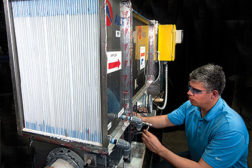Home » renewable energy
Articles Tagged with ''renewable energy''
Grants to help cut energy costs, create jobs, promote energy independence
Read More
Boston Tops Efficiency Scorecard
ACEEE ranks 51 US cities for energy-efficiency efforts in five policy areas
June 22, 2015
Renewable Energy’s Share of US Energy Consumption Highest Since 1930s
Renewable energy use grew an average of 5 percent per year over 2001-2014
June 11, 2015
UL, UC San Diego Partner to Develop Sustainable Energy Technology
Includes jointly conducting research and sharing testing techniques, results, and analyses
June 10, 2015
April 27, 2015: Global Investment in Renewable Energy Rebounds in 2014
Report Shows the First Global Increase in Investment in Three Years
April 27, 2015
SEIA Hails DOE Solar Jobs Initiative
DOE to Train 75,000 Americans for Jobs in Solar Industry
April 27, 2015
March 24, 2015: Trane Offers New Building Energy Services
Energy Can Be the Single Largest Operating Expense in a Typical Commercial Building
March 24, 2015
March 10, 2015: Renewable Choice Energy Joins RMI Business Renewables Center
Center Is Comprised of Renewable Energy Buyers, Project Developers, and Service Providers
March 10, 2015
Copyright ©2025. All Rights Reserved BNP Media.
Design, CMS, Hosting & Web Development :: ePublishing




